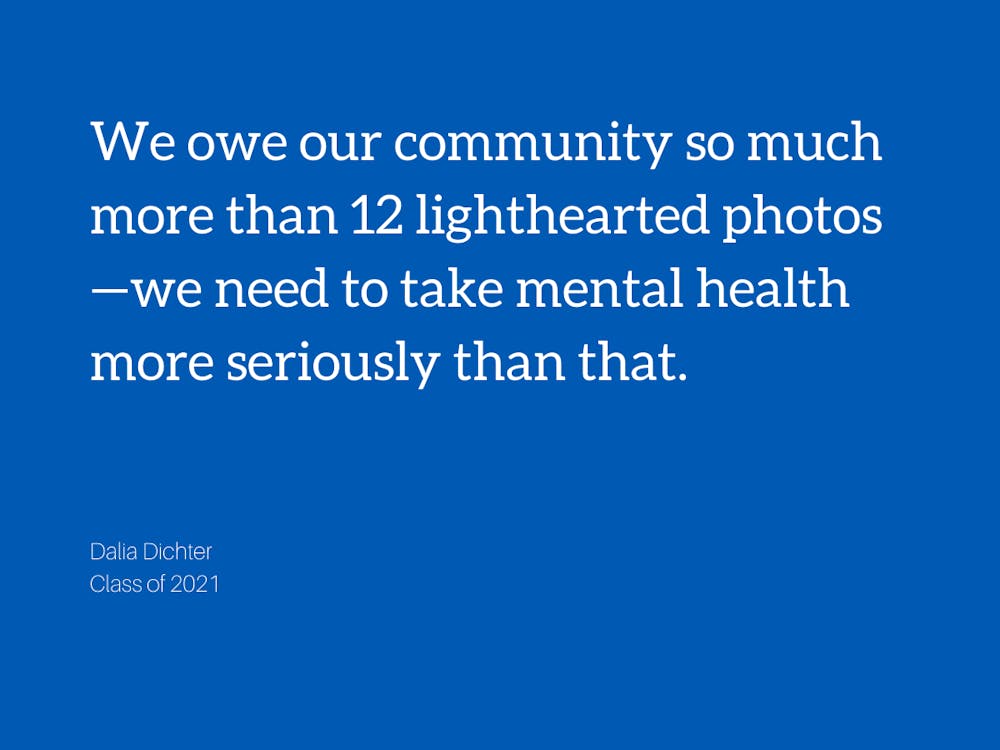Editor's Note: This story contains discussion of mental health and suicide that readers may find triggering. Reader discretion is advised.
*
I don’t know about you, but lately, my Instagram feed has been saturated by people participating in the “12 Challenge,” a social media campaign started by the handle @HereForYouDuke. The challenge is simple: post pictures or videos of yourself doing 12 of something in support of the “12 percent of college students who report having suicidal thoughts.”
With such great intentions, it’s easy to see why it caught on so quickly. But when many people responded by posting 12 pictures of their friends, of themselves partying or on vacation, it became evident that what started as a good-faith effort was quickly misused by the social media masses. Watching some of these posts, I can’t help but feel frustrated (and sometimes just angry) by the way people are engaging with such a serious topic.
I’m writing this column not to put anyone down or make anyone feel bad, but because we owe our community so much more than 12 lighthearted photos—we need to take mental health more seriously than that. The reality is that one in five students, or 20 percent as opposed to 12 percent, reported having thoughts of suicide in a 2018 Harvard Medical School survey of 67,000 students across 100 campuses. With this higher statistic comes an even greater need to raise awareness about mental health and suicide, so I appreciate the group of students behind the initiative for trying to spark that conversation. However, like many other students, my experience with mental illness cannot be summed up by posts or pictures on social media.
Over the course of my three years at Duke, I have struggled deeply with my mental health. As a first-year, I spent my fair share of time at CAPS, where I was diagnosed for the first time with various mental health disorders. As a sophomore, I was sexually assaulted and diagnosed with PTSD. And as a junior, I spent a week in the hospital for exactly the same reason that we’re having this conversation in the first place.
So, I’m grateful we are trying to have these conversations—I really am—but we need to do so in a more meaningful way. Posting a video of yourself doing something goofy can trivialize the severity of this issue. Posting a funny picture does not actually symbolize that you’re “there” for someone. And, posting a photo series of you with your friends at parties, or wherever, can serve as a painful reminder of the loneliness and isolation that many people are experiencing, especially during this time of quarantine.
It bears repeating: You really never know who is struggling with their mental health or who is suicidal. Yes, symptoms can include withdrawing from your friends and family, talking about emptiness or having extreme mood swings, but those behaviors aren’t always easy to recognize, especially if you’re not looking for them. The same person who walks around campus with a smile on their face, says hi to everyone they see, participates in class, goes to social events and lives the “effortlessly perfect” Duke life—that person could very well be struggling with suicidal thoughts.
I really hope that everyone who posted for the “12 Challenge” has also reached out to their friends or donated to important nonprofits (or both!), but honestly, who knows? It is so easy to say, “my DMs are always open!” or “I’m #hereforyou”—both of which are great, as long as they’re true. But your activism has to be more than just performative, and it needs to go beyond posting stories that basically brag about how great your life is. We can all do more.
I am so grateful to all of my friends who picked up the phone at 1:00 a.m., sat with me in Perkins for hours, let me sleep at their apartments, visited me while I was in the hospital or even just sent a random text to check in. Those people were there for me, and that has made more of a difference than any of these posts from the last week ever could.
None of this should be a news flash. Most of us aren’t trained professionals—I certainly am not, but we all can be really good friends. I appreciate that instead of assuming they knew what I needed or offering hollow texts, my friends took the time to figure out what I was actually looking for and how they could provide it—something we all should strive to do for our loved ones. They listened to me talk about how hard things were getting and let me detail every aspect of my mental health, even when it made them uncomfortable or overwhelmed. But that’s the thing: these conversations are uncomfortable. They are raw. They are difficult. But they are also real, and they are important. They deserve so much more of your time and attention than just an Instagram story.
So, I challenge all of you to take a second longer and think a little harder about what you are posting and how those posts can impact the people around you. Or better yet, I challenge you to rethink what being there for someone means entirely.
I’m pretty sure you’ve got the time.
Dalia Dichter is a Trinity junior.
If you are having thoughts of suicide, call the National Suicide Prevention Lifeline at 800-273-TALK (8255) or text “START” to the Crisis Text Line at 741-741.
Get The Chronicle straight to your inbox
Signup for our weekly newsletter. Cancel at any time.

